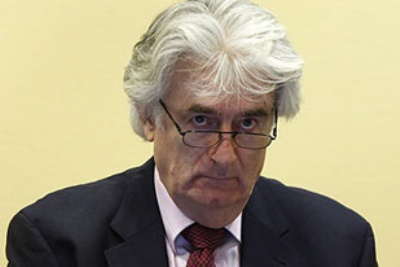
Radovan Karadzic, the former Bosnian Serb leader, has told judges at his genocide trail in The Hague that Serbs made several attempts to avoid war in the run-up to the Bosnian conflict.
He said on Tuesday that Serbs had been prepared to give up their own political assembly in Yugoslavia to prevent the war.
He further said that ethnic and religious tensions at the time had been heightened by a Muslim police force "wreaking havoc" on Serbs.
Addressing the court on the second day of the opening statement of his defence, Karadzic said: "The Serbs attempted before the beginning of the war several chances and options for peace and they were even prepared to give up on their own assembly.
"There was massive, massive abuse of the joint police, the Muslim police. They were wreaking havoc. We can see that as testified by prosecution witnesses."
Karadzic had ended his months-long boycott of the proceedings on Monday when he appeared before the International Criminal Tribunal for the former Yugoslavia.
The wartime Bosnian Serb leader is accused of having colluded with Slobodan Milosevic, the late Yugoslav leader, with the aim of creating a "Greater Serbia" that was to include 60 per cent of Bosnian territory.
Ethnic cleansing
Karadzic stands charged as the "supreme commander" of an ethnic cleansing campaign of Croats and Muslims in the 1992-95 Bosnian war in which 100,000 people were killed and 2.2 million displaced.
He is facing 11 counts of genocide, war crimes and crimes against humanity, but though he denies any wrongdoing, he has refused to enter a formal plea.
Among the charges against Karadzic are the 1995 Srebrenica massacre of more than 7,000 captured Muslim men and boys, and the 44-month siege of the capital Sarajevo that ended in November 1995, leaving about 10,000 people dead.
On Monday, he told the court that the Bosnian wars during the 1990s were "just and holy".
Karadzic told judges that the Bosnian Serbs had defended themselves against Islamic fundamentalists who had started the war in Bosnia to lay claim to the entire country.
"I will defend that nation of ours and their cause that is just and holy. We have a good case. We have good evidence and proof," he said.
Serbian reaction
Aljosa Milenkovic, a Serbian journalist, has been following the trial through the country's media.
Speaking to Al Jazeera from Belgrade, he said: "Locals here ... feel like they have been villainised by the international and foreign media for the last 10 or 15 years.
"And now it's the time for Karadzic to tell the Serbian side to the world.
"But nevertheless, regardless of those feelings, which are very popular here in Serbia, Serbian media is still not giving much attention to his trial.
"Regarding reconciliation in Belgrade, it's a totally different perspective, I reckon, because Serbs were feeling that they were not guilty for the civil war which broke out in former Yugoslovia, as Bosnians and Croatians feel they are not guilty.
"So the process of reconciliation should have started many years ago and is still not in progress.
"Just recently, I spent some time in Bosnia speaking to locals and politicians, and the most significant thing is the youngsters, who are feeling more separated from their neighbours, from Serbia, or Croatia, or Serbs and Croats inside Bosnia.
"If someone is trying to put reconciliation in the core-and-bone structure of this region, they are not doing a good job."
Nato manhunt
First indicted in 1995, Karadzic eluded a Nato manhunt for more than a decade before being caught in July 2008 in Belgrade, where he had been living as a new-age philosopher.
He faces possible life imprisonment if convicted in what is one of the last and largest cases brought to the UN war crimes tribunal for the former Yugoslavia.
The UN Security Council, which set up the tribunal in 1993, has ordered it not to open new cases.
The tribunal has indicted 161 political and military officials, of which 40 cases are still continuing.
Two fugitives, Ratko Mladic, Karadzic's former top general, and Goran Hadzic, a Croatian Serb leader, could still be brought to trial at The Hague.














